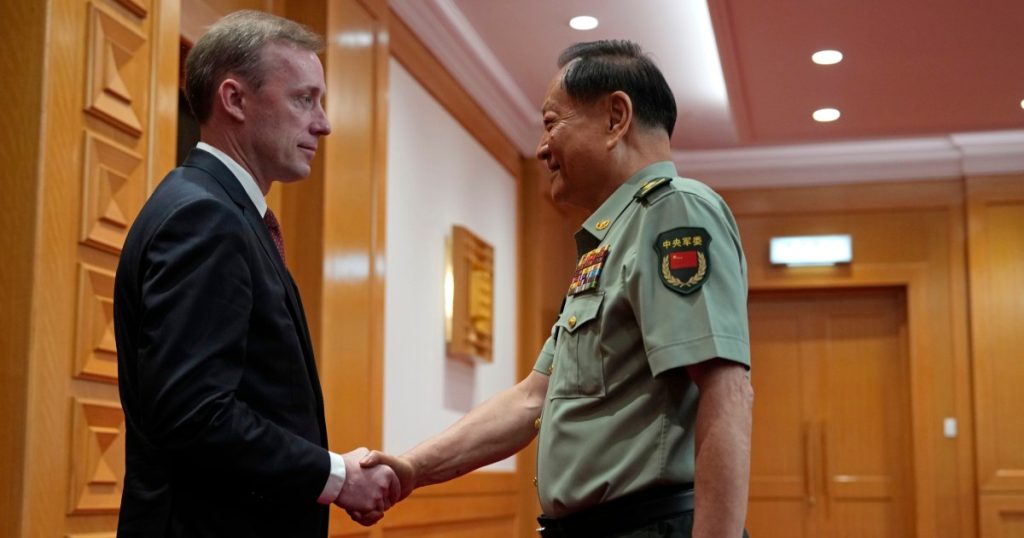National security adviser Jake Sullivan met with a top Chinese defense official in Beijing, marking the highest-level public engagement the Biden administration has had with the Chinese military. Sullivan stressed the importance of preventing competition from escalating into conflict and emphasized the need for peace and stability in the Taiwan Strait and the South China Sea. The meeting comes as military tensions rise between China and U.S. allies in the Asia-Pacific region, with Washington criticizing Chinese pressure on Taiwan and military actions in the South China Sea. Zhang Youxia, vice chairman of China’s Central Military Commission, stated that maintaining stability in U.S.-China military and security matters is in both parties’ interest and is what the international community expects.
Sullivan also raised concerns about Chinese support for Russia’s defense industry amid the war in Ukraine. Zhang emphasized that Taiwan’s status is a core interest of China and urged the U.S. to stop military collusion with Taiwan, arming Taiwan, and spreading false narratives. He stated that “Taiwan independence” and peace in the Taiwan Strait cannot coexist, likening them to fire and water. This meeting marks the first time a U.S. official has met with a commission vice chair since 2018. Sullivan’s visit to Beijing is part of an effort to address tensions in the important U.S.-China relationship, with talks also held with Chinese Foreign Minister Wang Yi.
The discussions between Sullivan and Wang Yi were described as candid, substantive, and constructive, covering a range of bilateral, regional, and global issues. Both sides welcomed ongoing efforts to maintain open lines of communication, including planning for a leader-level call between President Joe Biden and Chinese leader Xi Jinping in the coming weeks. Plans for a call between their respective military theater commanders were also discussed, with Xi agreeing to resume military-to-military communications last year after cutting them off in 2022 in response to a visit to Taiwan by U.S. House Speaker Nancy Pelosi. The Chinese foreign ministry indicated that a new round of interaction between the two heads of state is on the horizon.
The White House noted the importance of peace and stability in the Taiwan Strait and reaffirmed the U.S. commitment to freedom of navigation in the South China Sea during the discussions. This is significant considering the rising tensions in the region and China’s territorial claims, particularly in the South China Sea. The Biden administration’s engagement with the Chinese military highlights the complex dynamics at play between the two countries and the efforts to manage potential conflicts. The focus on dialogue and communication indicates a desire to prevent misunderstandings and promote stability in the region.
The meeting between Sullivan and Zhang Youxia reflects the ongoing efforts to navigate the challenges in the U.S.-China relationship, particularly in the military and security domains. The emphasis on preventing conflict and promoting peace underscores the shared interest in stability despite the differing views on contentious issues like Taiwan. The upcoming leader-level call between Biden and Xi Jinping will be crucial in furthering communication and addressing key concerns between the two countries. The overall goal seems to be to find common ground while also addressing areas of disagreement to manage the complex relationship effectively.
As China continues to assert its dominance in the region and strengthen its military capabilities, the U.S. faces a delicate balancing act in maintaining security and stability. The Biden administration’s engagement with Chinese officials signals a willingness to address challenges through dialogue rather than confrontation. By emphasizing the importance of preventing conflict and upholding international norms, both countries are seeking to navigate the complexities of their relationship in a way that serves their interests while minimizing the risk of escalation. The upcoming interactions between military leaders and heads of state will be critical in shaping the future trajectory of U.S.-China relations and managing potential flashpoints in the Asia-Pacific region.


